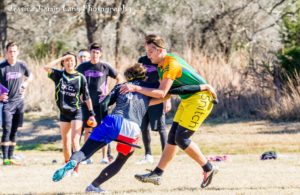- Rule, Britannia, no more?
- Unpopular Opinions: US Quadball Cup 2023
- Proven Contenders: University of Virginia
- Proven Contenders: Rutgers University
- Proven Contenders: University of Michigan
- Proven Contenders: Creighton University
- Different Perspectives: A Look Inside USA Ultimate
- Antwerp QC, Much of Belgian Core, Leaves Competitive Quidditch
Will They or Won’t They: University of Maryland, #3
- Updated: October 7, 2014

Credit: Nicole Harrig
In addition to our preseason rankings, The Eighth Man staff will be releasing a series of articles focusing on the top 20 teams, counting down from 20 to one. Each article will be written by two members of the staff, one who believes the team will live up to or exceed expectations and one who thinks they will come up short.
VIDEO SPEAKS LOUDER THAN WORDS
By Ethan Sturm
I was originally supposed to write the “won’t they” section of this article. I had it all planned out. Then I had the opportunity to watch University of Maryland play at Turtle Cup, where the Terrapins put on a near-spotless performance despite it being their first tournament of the season. They have the depth and physicality of an elite Southwest team and have developed an organized, lethal passing attack capable of breaking down even stout defenses.
But I have spent enough words on Maryland already, from my Monday Water Cooler after Turtle Cup to my podcasts. Instead, I am going to let the video speak for itself. After all, if a picture is worth a thousand words, a few videos should be good for a few million?
Maryland v. UNC
Maryland v. Villanova
REGIONALS, THEN BUST
By We Breathe Quidditch
The University of Maryland Terrapins have always been an elite team. At World Cup VI, the Terrapins were dominant, narrowly losing two in-snitch-range games to Lost Boys and Bowling Green State University. At World Cup VII, UMD had a few hiccups in pool play but went on to give the eventual World Cup champions their hardest matchup ever. This fall, Maryland obliterated all competition at their own Turtle Cup–proving once again that they were the best team in the Mid-Atlantic. However, they faced no true competition and thus their performance, while statistically impressive, is not indicative of a No. 3 team.
Granted, Maryland fixed all the errors and assuaged all the fears of many of their detractors after World Cup VII. People argued that Maryland was inconsistent, losing to Harvard University and narrowly escaping Tennessee Tech University before holding University of Texas to only 60 quaffle points. And for the longest time, Maryland has struggled to put on a show of superiority, even within their own region. Maryland barely edged out Villanova in the last Mid-Atlantic Regional and lost to Villanova in snitch range in the finals of the regional before the last.
That was not the case at Turtle Cup, where Maryland decimated Villanova 160*-30 before toppling UNC 150*-60 in the finals. While no one expected anything less than an out-of-snitch-range win by Maryland, the method by which Maryland won was rather worrying.
UNC’s chasing defense is horrible. If it was not for UNC’s beaters, they would have lost the finals of the Minerva Cup to Appalachian State University. Maryland’s chasers, therefore, were leagues above UNC’s and thus it is no surprise that Maryland boasts impressive stats in this regard, including a 57.1 percent scoring rate against one bludger and a 40.0 percent scoring rate against two.
Maryland’s beater play as well as their defense in that game, however, was uncharacteristic of a top-10 team, much less one that is ranked No. 3. On average, Maryland lost bludger control every two drives. True, they also got bludger control back in an average of two drives, but that was only because they were playing UNC. On defense, a few of Maryland’s male beaters did not even attempt to keep bludger control–when they were about to get beat they did not throw the bludger back at the hoops. Their fellow beater was too focused on quaffle play to help. Perhaps bludger control was never a priority in this game–Maryland was, of course, facing an unranked UNC team.
What if Maryland had been playing against Baylor University or Texas? That sort of bludger fluidity would result in the other team taking bludger control and keeping it for much longer than two drives. If Maryland tells their back beaters to focus on maintaining bludger control, Baylor or Texas will score consistently against the Maryland defense. Even UNC scored three out of eight times against a one-bludger Maryland defense (although this was mainly due to effective use of the 1.5 bludger technique).
I did not see the smart beating play I saw Maryland use against Emerson College in the last Turtle Cup, nor did I see the smart defensive beating that Maryland used against Texas in the last World Cup. Perhaps Maryland changes their style of play when they face elite opposition. However, the beating strategy was not even the most worrying fault in the Terrapins’ style of play.
The offensive stat of 57.1 percent scoring against a one-bludger defense is truly an impressive one. But it belies the manner in which these goals were made. Maryland succeeded due to a good passing game and great positioning. But this statistic is more indicative of the weakness in the UNC defense than the skill in the Maryland offense. Very few players on Maryland showed driving ability–almost all the scores came from passes right by the hoops or shots taken from a close distance away. The Terrapins’ sole drive against zero bludgers resulted in a turnover.
I will not deny that the Maryland passing game is possibly the second best I have seen in the entire nation at this moment. The Maryland chasing defense is likewise elite. But if the Terrapins cannot find a way to excel in almost all aspects of the game, other teams will pick at their weaknesses and devise a plan to beat them.
Maryland is blessed with an impressive array of seekers and a large number of returning players who understand the Maryland scheme and have great chemistry with each other. And no team at the moment excels in all three areas of quidditch. Texas lacks a seeker, Lone Star Quidditch Club lacks a passing game and so on. But Maryland has more than one weakness at the moment. If they continue playing in an uncompetitive region with these weaknesses, do not be surprised if a repeat of the Harvard game happens at World Cup VIII.



